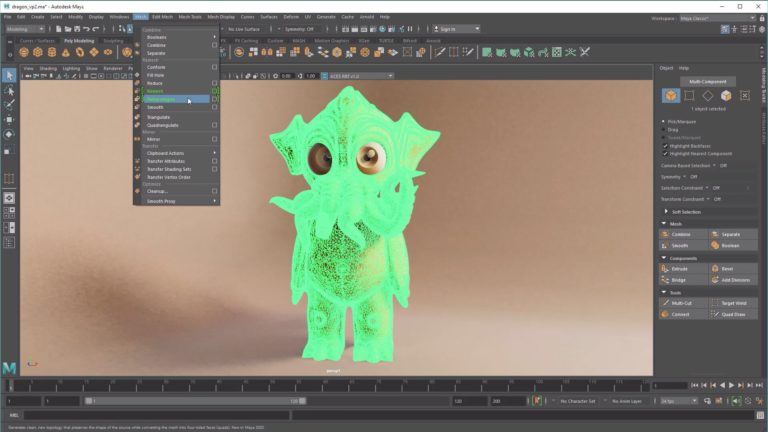Supported by Adobe, School Places Students in Hollywood Facilities and at Its Own Studio
Founded in 2011, Exceptional Minds is a vocational school with a difference. Based in Sherman Oaks, CA, the digital arts school and studio educates autistic adults for careers in media and entertainment. That goal may be lofty, but it is hardly theoretical — in spring 2016, Exceptional Minds graduated its first class of students, some of whom are already working at Hollywood facilities. Others have joined Exceptional Minds' own digital studio, which has completed jobs on projects including Dawn of the Planet of the Apes and Avengers: Age of Ultron.
It's a big step for people that are in many cases marginalized. "We have a guy who was working at Albertson's [grocery]," says Exceptional Minds Executive Director Ernie Merlan. "They told him he'd never make it past Albertson's. He came to us for three years, and now he's working at Stargate Studios."
Getting Started
Merlan didn't come to this work as an autism activist. For years, he was an art director and scenic artist running his own digital studio, doing work for theme park attractions including fly-throughs, previsualization and digital murals. One day, he remembers, he was visited by a group of parents who had started a "one-room schoolhouse" for autistic teenagers on Ventura Boulevard and were wondering how to take the next step in preparing them for careers in digital media. They had raised some $250,000 in donations to create a new school to educate nine promising students, and were looking for someone to lead it, Merlan says.
At first, Merlan would only commit to a few hours a week. But his commitment quickly grew, and he eventually devoted himself to the new endeavor. "Here's a bunch of kids who won't look you in the eye — won't shake your hand, certainly — and have few communication skills," he says, describing the appeal. "But they were doing good artwork. And I saw potential in what they were doing."
This promotional video was presented on stage at the Adobe Max conference this year.
Building a Curriculum
So Merlan helped build out a three-year program for the students, using Adobe software to teach digital content creation. The first year concentrated on essentials, introducing principles of animation and design via Photoshop and Animate. In the second year, students move into compositing and editing via Premiere Pro and After Effects. The third year is dedicated to specific, detailed training in jobs that the school feels confident will be available to students.
"We first started by asking [studios], 'What kind of work is available at entry level that you're sending to Korea or India?'" Merlan explains. "We discovered that roto, green-screen cleanup, and rod removal tasks were being sent abroad. So we asked, 'What if we could keep a little bit of that here? If you're sending 40 shots to India, leave us four.' Places like Marvel and HBO latched onto this idea and started giving us work."
Some students have had luck getting job placements. One graduate is at Stargate Studios and another at Mr. Wolf. Others have received internships at places like Cartoon Network and Nickelodeon. And more graduates go to work at the school's internal studio, which has contributed work to Game of Thrones, five Marvel movies, and The Walking Dead, among others.
Diversity and Inclusion
Key to the operation's success has been support from Adobe, which has donated products, awarded cash grants, and extended nonprofit pricing to the school. Adobe also featured Exceptional Minds on the main stage at its Adobe Max conference this year in an effort to encourage attendees to hire them. "We have a deep commitment to cultivating diversity and inclusion in the workforce," Adobe VP of Corporate Responsibility Holly Campbell told StudioDaily. "We also have a strong commitment to supporting the next generation of creatives and coders. Finally, we are committed to operating with integrity and to respecting and advancing human rights in our business. When you take all three of those things and put them together, and look at what Exceptional Minds is doing, it's a great fit."
Asked how Exceptional Minds has been so successful in getting traditionally risk-averse Hollywood to award jobs to autistic students, Merlan cited growing awareness of autism in the world at large. "All of us, whether we think so or not, have someone that touches our lives who has autism," he says. "I didn't know anyone with autism, and I certainly had no autism training. But within a month, I realized my cousin's daughter has autism, and I started to build a relationship with her. Now she calls me on a weekly basis. So we're all touched by it. The studio heads all have some sort of connection to autism."
Next Steps
The next step, strategically, is to expand the concept beyond Hollywood and into other industries. "We're looking at sharing a version of our program with high schools and schools of lower learning to prepare students for us," he said. "We've helped other schools get started — students from The Uniquely Abled Project work on CNC machines making airplane parts, and MindSpark does testing of computer programs. We're thinking of expansion, but also: how do we help Main Street America create programs these guys can function in?
"Hollywood is our home town. If I was in San Diego, I'd go to the military. If I was in San Francisco, I'd hit Silicon Valley. Could they work with local videographers, T-shirt shops, sign companies, or local TV news? It's about changing hearts and minds about what's possible with people with autism."
For now, facilities that are interested in sending work to Exceptional Minds are invited to visit the school's website to see what it can offer. "If there's a job you can send our way, call us," he says. "We'll give you a bid on it and tell you how much time it'll take to do it. In this industry, it's not about doing the job. You've got to do the job well and turn it in on time, and we've done that every time. So throw us a couple of shots and see how efficiently we can get them back to you. Once people come into our building, they fall in love and see the value in what these guys can offer."
At Adobe, Holly Campbell agrees that Exceptional Minds offers real value for studios, agencies and other companies seeking to support diversity in the industry. "Talent comes in a multitude of different shapes and sizes, and it doesn't always look the same," she says. "We're encouraging our customers to think more broadly about creative talent and what the possibilities are."
Exceptional Minds: www.exceptionalmindsstudio.org
Did you enjoy this article? Sign up to receive the StudioDaily Fix eletter containing the latest stories, including news, videos, interviews, reviews and more.











Leave a Reply